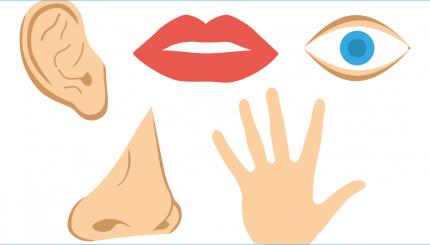Rosh Hashanah is coming. I know, because rabbinic colleagues are posting on Facebook about their daily preparation of sermons, and Jewish blogs are focusing on the daily introspection prescribed for the month of Elul. I heard the shofar blast in Tuesday morning prayers last week and started the countdown to 5777 on the whiteboard in my classroom.
When is Rosh Hashanah 2017? Click here to find out!
Nothing has been more meaningful in my journey toward the High Holidays than reading Ginny Kubitz Moyer’s latest book from Loyola Press, Taste & See: Experiencing the Goodness of God with our Five Senses. This book — listed in the Ignatian Spirituality section of a Jesuit publishing house — is a source of inspiration in my search to elevate everyday experiences and imbue them with holiness. This book’s author–a high school English teacher in California–is my spiritual guide.
I met Ginny once, just over two years ago, after encountering her blog and reaching across the country in cyberspace to establish a virtual connection. Having read and reviewed her previous book, Random MOMents of Grace, I realized we shared common values and deeply-held beliefs, and when we finally met in person it felt like I was seeing an old friend. Reading Taste & See felt like a reunion of souls on the page.
Ginny has the uncanny ability to draw me into her stories, which are at once personal and universal. Her writing challenges me to examine my relationship with the Divine through the lens of my relationships with my spouse, my children, and my closest friends. In Taste & See, she writes about a friend who offered her encouragement: “We all have experienced a conversation like this sometime in our lives, some life-altering moment when we hear words that break us free.” (p. 60) Suddenly I am reminded, transported back in time, to such a conversation.
Ginny’s writing about Catholic prayer or ritual truly transcends the particulars of her religious tradition, as she invites the reader to smell the candle burning in her home during Advent. She expands the circle of light and warmth surrounding this one candle to encompass, in my mind, every Sabbath candle and Hanukkah menorah I’ve kindled: “It’s the smell of four family members gathering together to do a faith ritual they aren’t entirely sure they know how to do but which somehow turns out to be exactly right.” (p. 101)
When I agreed to review Taste & See it was late spring, and I was caught up in our family’s move to a new home when Ginny’s book arrived in the mail. I set it aside for a season until I could give it my full attention. What I thought was procrastination I now believe is what Ginny might call God’s grace. The time to experience the goodness of God is the present, and Ginny’s book is a gift that enables me to do so.
Hanukkah
Pronounced: KHAH-nuh-kah, also ha-new-KAH, an eight-day festival commemorating the Maccabees’ victory over the Greeks and subsequent rededication of the temple. Falls in the Hebrew month of Kislev, which usually corresponds with December.
menorah
Pronounced: muh-NOHR-uh, Origin: Hebrew, a lamp or candelabra, often used to refer to the Hanukkah menorah, or Hanukkiah.
Rosh Hashanah
Pronounced: roshe hah-SHAH-nah, also roshe ha-shah-NAH, Origin: Hebrew, the Jewish new year.
shofar
Pronounced: sho-FAR or SHO-far, Origin: Hebrew, a ram’s horn that is sounded during the month of Elul, on Rosh Hashanah, and on Yom Kippur. It is mentioned numerous times in the Bible, in reference to its ceremonial use in the Temple and to its function as a signal-horn of war.


